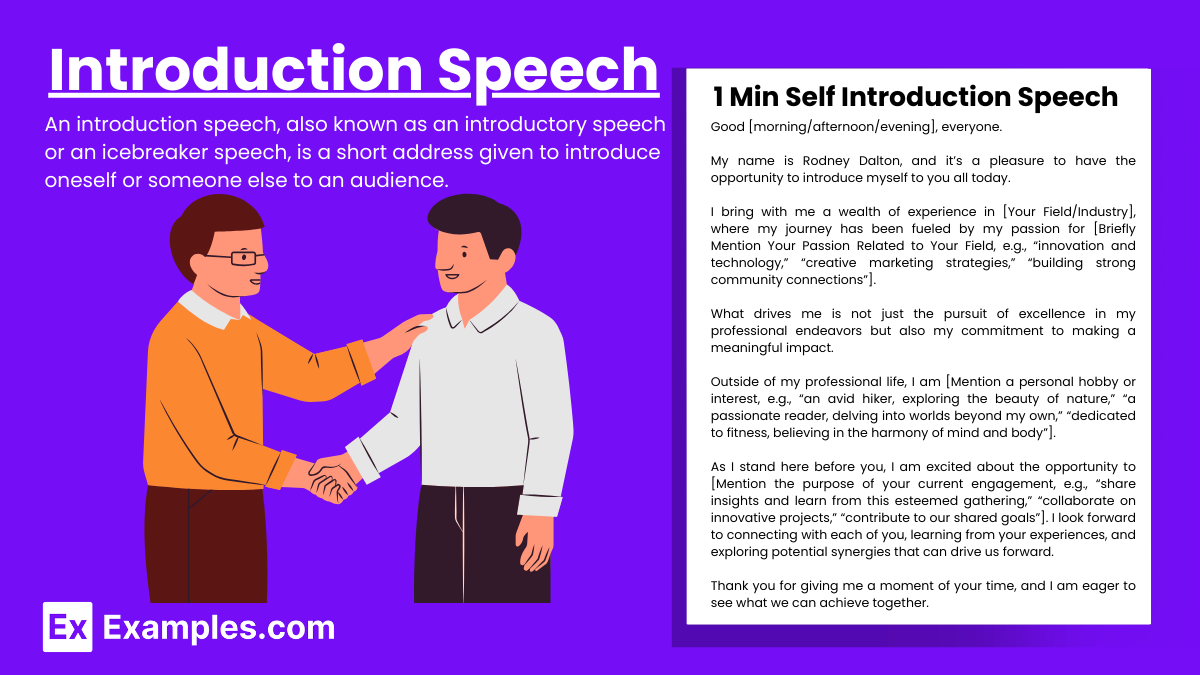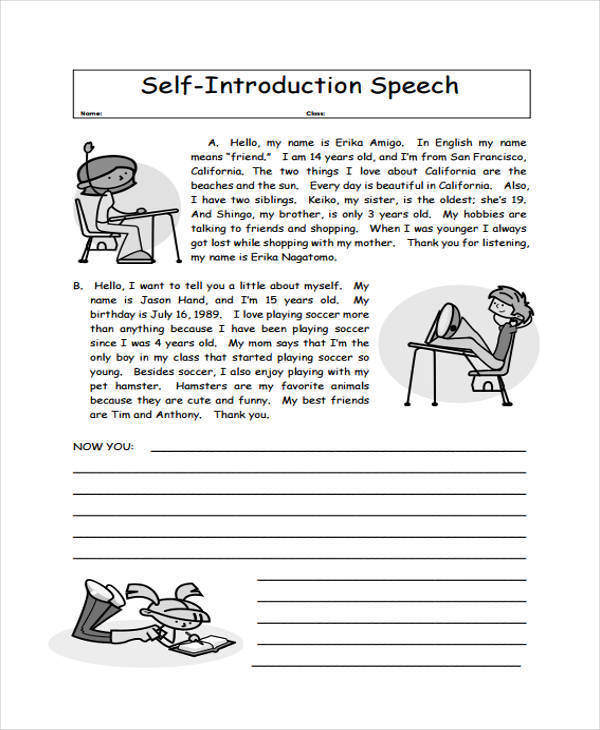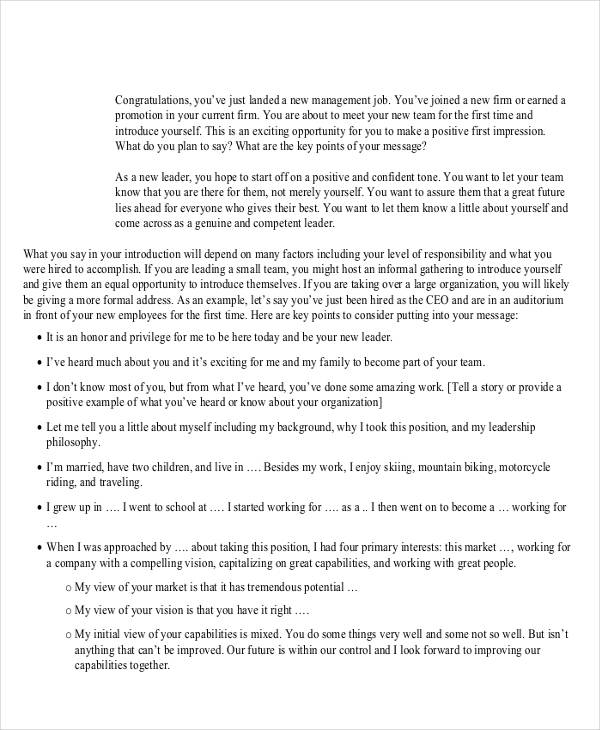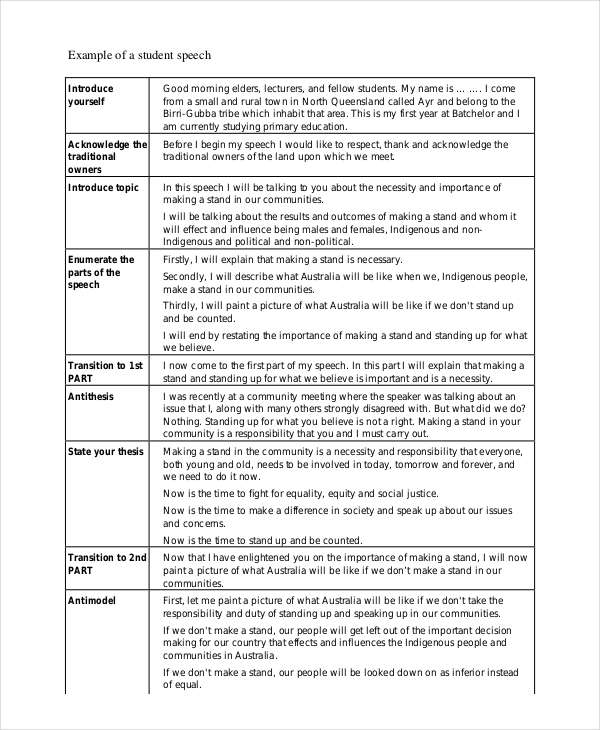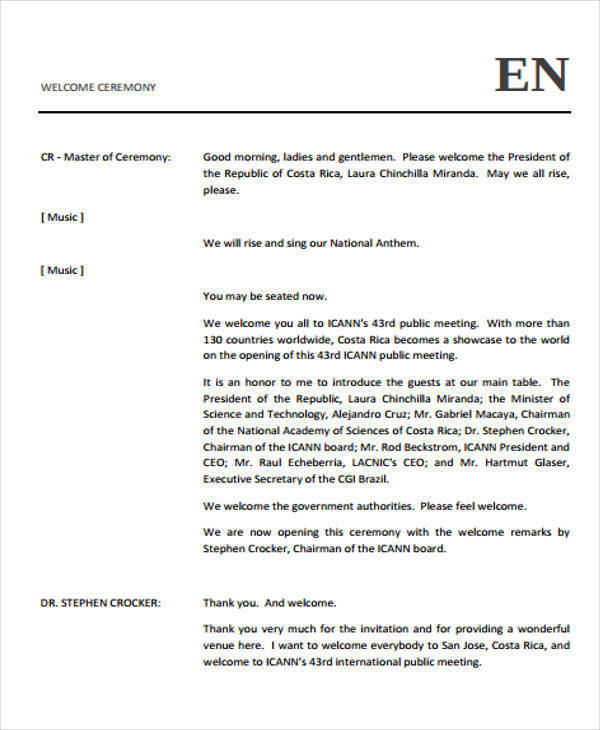39+ Introduction Speech Examples to Download
Discover the art of crafting compelling introduction speeches through our comprehensive guide. Whether you’re a beginner or a seasoned speaker, our step-by-step approach simplifies the process. Explore a rich collection of speech examples, tailored to inspire and improve your public speaking skills. Master the nuances of delivering impactful introductions that captivate your audience, using our expertly curated speech examples as your roadmap to success.
What is Introduction Speech?
An introduction speech, also known as an introductory speech or an icebreaker speech, is a short address given to introduce oneself or someone else to an audience. The purpose of an introduction speech is to provide relevant information about the person being introduced, set the tone for the event or presentation, and establish a connection with the audience. This type of speech is commonly used in various settings, such as conferences, meetings, seminars, social events, and classrooms.
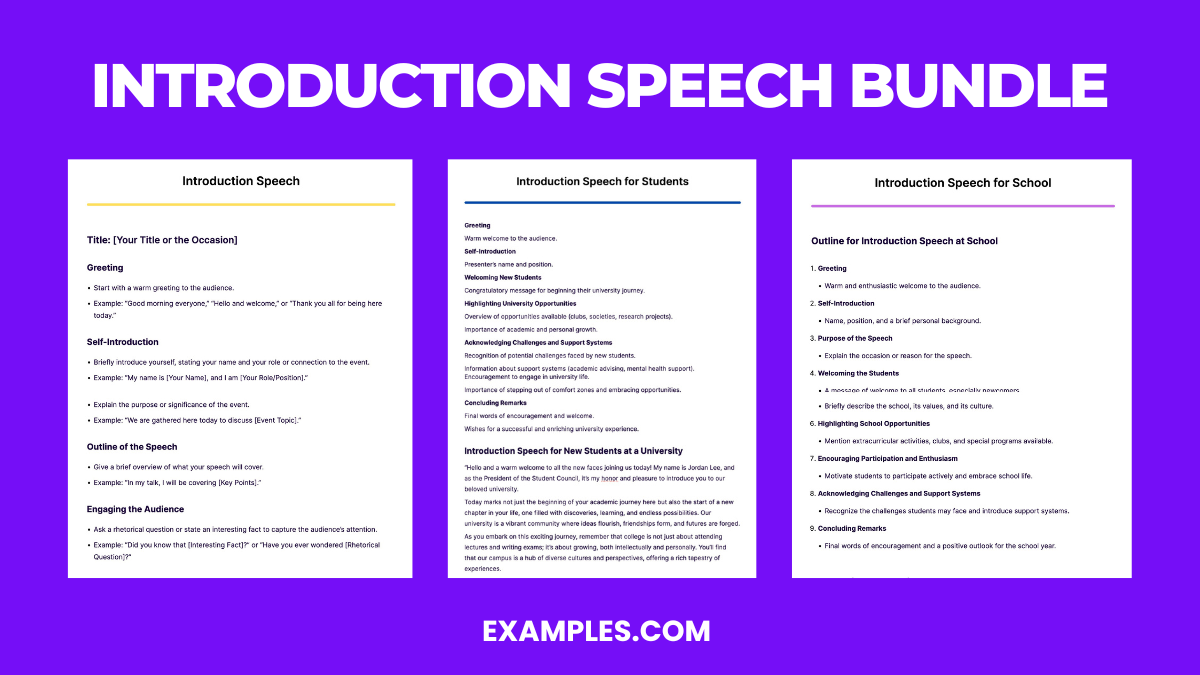
Download Introduction Speech Bundle
A speech can be of any form and used for various functions. It can be a thank-you speech to show one’s gratitude or even an introduction speech to introduce a person (even oneself), product, company, or the like. In these examples, let’s look at different speech examples that seek to introduce.
Introduction Speech Example
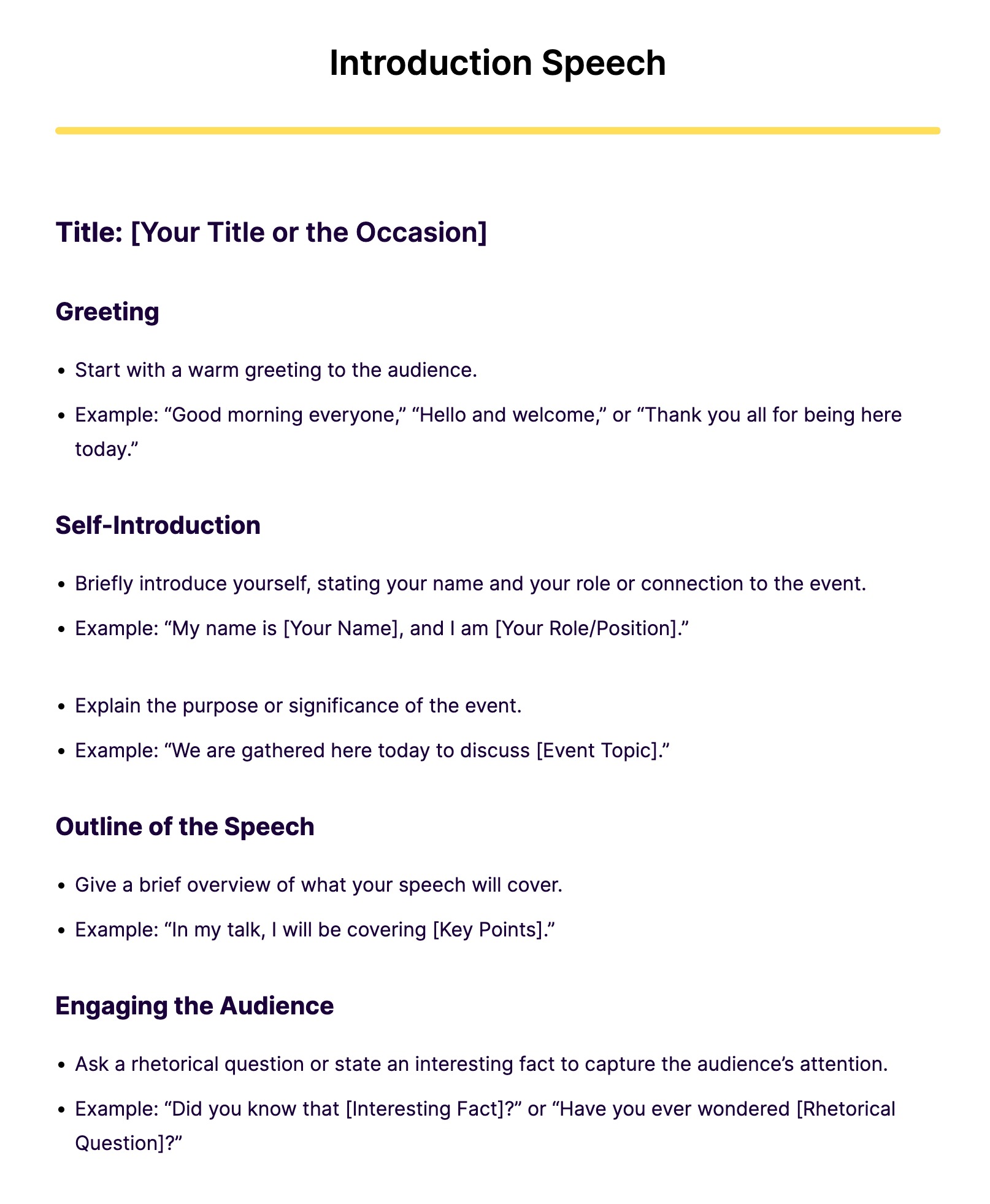
Introduction Speech for Students
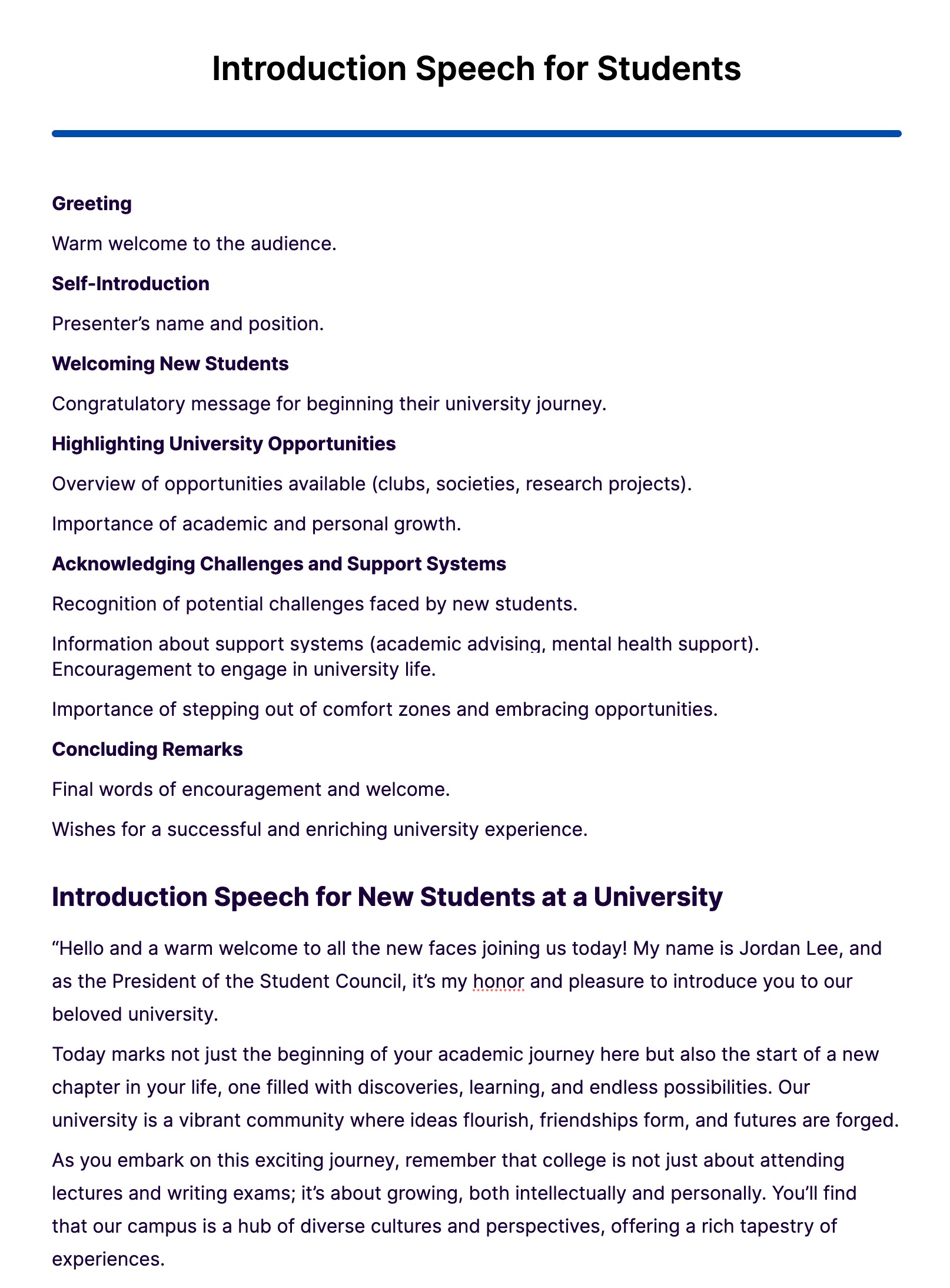
Introduction Speech for School
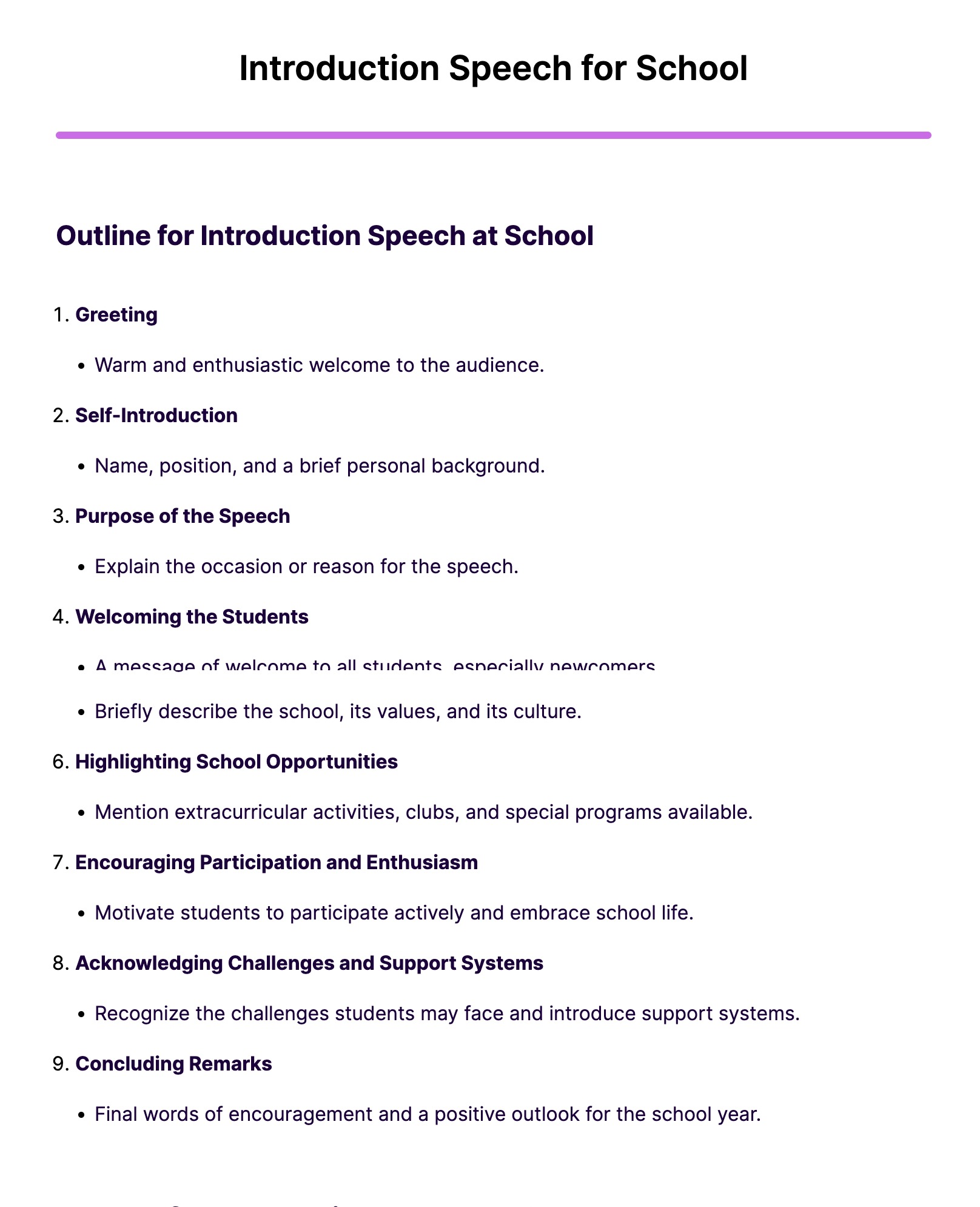
Self-Introduction Sample
Short Introduction Speech
Introduction Speech for Employee
Introduction Speech for Students
Formal Introduction Sample
More Introduction Speech Examples and Samples
Self Introduction Speech for Interview
Self Introduction Speech for School Students
Self Introduction Speech for Middle School
Self Introduction Speech for University
New Manager Introduction Speech
Introduction Speech for an Event
Introduction Speech for Freshers Party
Introduction Speech for Guest Speaker
Introduction Speech for Seminar
Introduction Speech for Conference
Introduction Speech for Workshop
Introduction Speech for Award Ceremony
Introduction Speech for Corporate Event
Introduction Speech for Team Meeting
Introduction Speech for Annual Day
Introduction Speech for Webinar
Introduction Speech for Cultural Event
Introduction Speech for Product Launch
Introduction Speech for Training Session
Introduction Speech for Charity Event
Introduction Speech for Graduation Ceremony
Introduction Speech for Farewell Party
Introduction Speech for Business Meeting
Introduction Speech for School Assembly
Introduction Speech for Panel Discussion
Introduction Speech for Retirement Party
Introduction Speech for Anchoring
Introduction Speech for Program
How to Write a Introduction Speech?
1.Greeting
Start with a warm and friendly greeting to the audience.
Example: “Good afternoon, everyone.”
2. Self-Introduction (if introducing yourself)
State your name and your role or position.
Example: “My name is [Your Name], and I am [your position, e.g., ‘the new marketing manager’].”
3. Purpose of the Speech
Explain why you are speaking and the context of the event.
Example: “I’m here today to introduce our guest speaker, [Speaker’s Name].”
4. Background Information
Provide relevant details about the person being introduced, such as their qualifications and achievements.
Example: “[Speaker’s Name] is a renowned expert in [field], with over [number] years of experience.”
5. Significance and Credentials
Highlight why the person is important and their qualifications to speak on the topic.
Example: “[Speaker’s Name] has received numerous awards, including [specific award].”
6. Personal Touch:
Add a personal anecdote or a light-hearted comment to make the introduction engaging.
Example: “When [Speaker’s Name] is not busy revolutionizing the industry, they enjoy hiking and cooking gourmet meals.”
7. Conclusion
Wrap up the introduction by reiterating the importance of the person or the event.
Example: “Please join me in welcoming [Speaker’s Name].”
8. Transition
Smoothly transition to the next part of the event or hand over to the person being introduced.
Example: “Without further ado, here is [Speaker’s Name].”
Tips For Introduction Speech
-
Start with a Greeting:
- Begin with a warm, friendly greeting.
- Example: “Good afternoon, everyone.”
-
Introduce Yourself:
- State your name and your role or connection.
- Example: “I’m [Your Name], [Speaker’s Name]’s colleague.”
-
State the Purpose:
- Explain why you’re speaking and the context.
- Example: “I’m here to introduce our guest speaker, [Speaker’s Name].”
-
Highlight Key Details:
- Share relevant background information and achievements.
- Example: “[Speaker’s Name] has over 20 years of experience in [field].”
-
Add a Personal Touch:
- Include a personal anecdote or light-hearted comment.
- Example: “Outside of work, [Speaker’s Name] enjoys hiking and gourmet cooking.”
-
Summarize Significance:
- Emphasize why the person is important.
- Example: “[Speaker’s Name]’s innovative work has set new industry standards.”
-
Conclude and Transition:
- Wrap up and smoothly transition to the speaker.
- Example: “Please join me in welcoming [Speaker’s Name].”
FAQ’s
What should an introduction speech include?
Include the speaker’s name, credentials, achievements, and relevance to the topic or event.
How long should an introduction speech be?
An introduction speech should typically last between 1 to 3 minutes, keeping it concise and engaging.
How can I prepare for an introduction speech?
Research the speaker thoroughly, practice your speech, and time yourself to ensure it’s concise and engaging.
How do I address the audience in an introduction speech?
Address the audience formally, using appropriate greetings such as “Ladies and Gentlemen” or “Distinguished Guests.”
Should I mention the speaker’s personal life?
Only mention personal details if they are relevant and appropriate for the context and audience.
How can I make the introduction speech engaging?
Share interesting and relevant facts, anecdotes, or achievements about the speaker that connect with the audience.
What tone should I use in an introduction speech?
Use a respectful, enthusiastic, and welcoming tone to create a positive atmosphere.
How can I start an introduction speech?
Begin with a compelling opening, such as a quote, anecdote, or interesting fact about the speaker.
Why is an introduction speech important?
It sets the tone for the speaker, builds credibility, and engages the audience, preparing them for the main presentation.
What mistakes should I avoid in an introduction speech?
Avoid overly long speeches, irrelevant details, mispronouncing names, and using a monotone voice.



